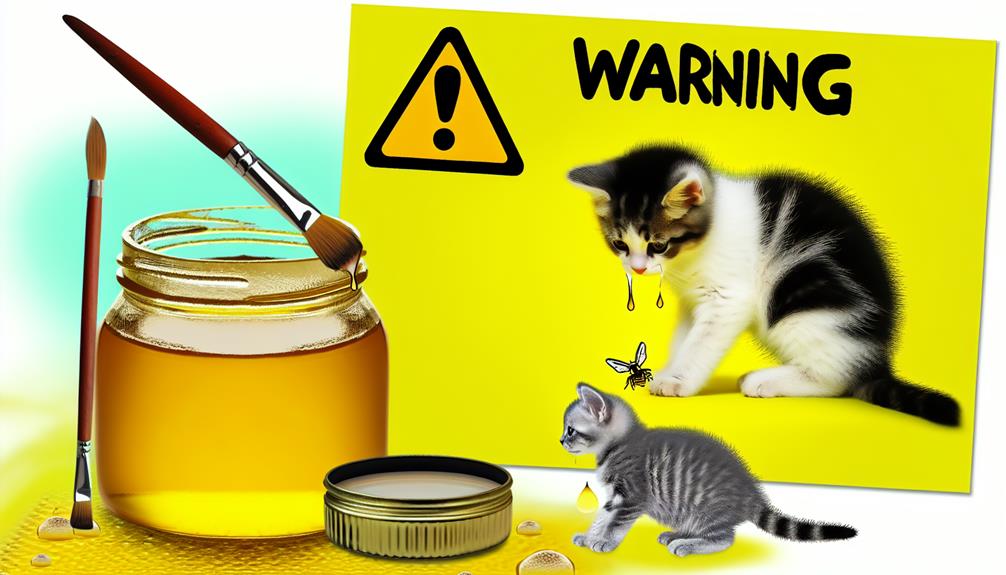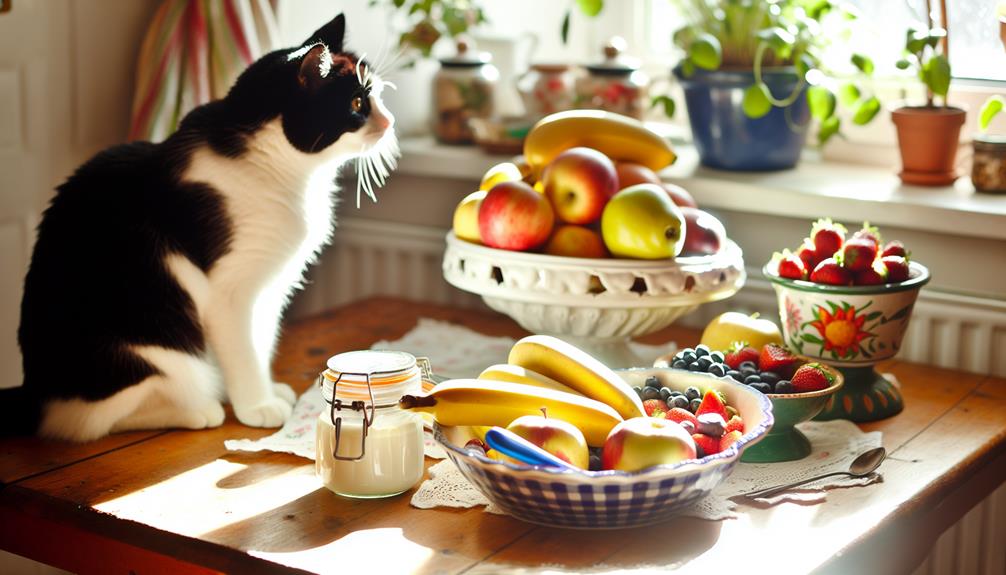You might be curious about whether or not it's safe to let your cat have a taste of honey. While cats can technically consume honey in small amounts, it's crucial to understand the potential risks and benefits before you offer it. Honey's high sugar content poses various health concerns such as digestive issues and obesity, but are there any situations where it might be beneficial? Knowing the proper serving practices and viable alternatives can make all the difference in ensuring your feline friend's well-being. So, what should you consider before sharing this sweet treat?
Nutritional Content of Honey
Honey, often lauded for its natural sweetness, is primarily composed of sugars such as fructose and glucose. You might already know that honey composition includes various other elements like water, pollen, enzymes, minerals, and vitamins. However, the predominant components are the simple sugars, which are easily absorbed by the human body. But when it comes to your cat's digestion, things get a bit more complex.
Understanding honey composition is essential in determining its suitability for feline consumption. Cats, obligate carnivores by nature, have a digestive system that's not well-equipped to handle high amounts of sugars. Unlike humans, cats lack significant amounts of glucokinase in their liver, an enzyme important for processing sugar. As a result, when a cat ingests honey, the simple sugars can pose a challenge to their metabolism, making it difficult for them to derive any nutritional benefit.
You should also consider the specific components of honey beyond its sugar content. While trace minerals and vitamins might seem beneficial, they're not necessarily aligned with a cat's dietary requirements. The enzymes and pollen present in honey can sometimes cause digestive disturbances in cats, leading to symptoms like diarrhea or vomiting.
Moreover, the high sugar content in honey can disrupt your cat's digestive balance. Cats primarily thrive on proteins and fats, and introducing a sugar-heavy substance like honey can lead to imbalances. This could potentially result in long-term issues like weight gain or even diabetes.
Health Benefits for Cats
When considering the health benefits of honey for your cat, it is vital to focus on scientific evidence and veterinary guidance. Honey, a natural sweetener, is often praised for its antimicrobial and antioxidant properties in humans. However, these benefits don't necessarily translate directly to cats.
Firstly, honey can potentially aid in cat digestion due to its prebiotic properties, which promote healthy gut bacteria. While it's true that healthy digestion is important for your cat's overall well-being, there's limited research specifically on honey's effects on feline digestion.
Here's a summary of potential benefits:
| Potential Benefit | Explanation |
|---|---|
| Antimicrobial Effects | Honey's natural enzymes can have mild antibacterial effects, though not thoroughly proven in cats. |
| Antioxidant Properties | Honey contains antioxidants that may support cellular health. |
| Prebiotic Support | Honey can help support beneficial gut bacteria, aiding cat digestion. |
| Wound Healing | Topically, honey can assist in minor wound care due to its antimicrobial properties. |
It's important to recognize that while these benefits sound promising, they are not backed by robust veterinary research for cats. Honey's antimicrobial properties could theoretically help with minor infections, but they're typically not a substitute for veterinary treatments. Similarly, its antioxidant content might support cellular health, but in such small quantities, the practical impact on your cat might be negligible.
Regarding wound healing, honey has been used topically in some veterinary practices. However, always consult your vet before applying honey to any wounds your cat might have.
Potential Risks and Side Effects

While honey does offer some potential benefits, it's equally important to understand the risks and side effects associated with feeding it to cats. One of the primary concerns is the possibility of allergic reactions. Cats, like humans, can be allergic to various substances, and honey is no exception. Symptoms of an allergic reaction in cats can include swelling, itching, and respiratory difficulties. If you observe any of these symptoms after your cat consumes honey, it's vital to consult a veterinarian immediately.
Another significant risk is digestive issues. Cats have a much simpler digestive system compared to humans, and their bodies are not well-equipped to handle certain types of sugars found in honey. Consuming honey can lead to gastrointestinal upset, manifesting as vomiting, diarrhea, or abdominal discomfort. In severe cases, prolonged digestive issues can lead to dehydration and further complications, requiring veterinary intervention.
Moreover, the high sugar content in honey poses additional risks. Cats are obligate carnivores, meaning their diet is primarily protein-based. Excessive sugar intake can contribute to obesity and related health issues, such as diabetes and dental problems. Even small amounts of honey can disrupt the delicate balance of a cat's diet, leading to long-term health implications if given regularly.
Lastly, honey can sometimes contain botulism spores, which are particularly harmful to young or immunocompromised cats. Botulism is a rare but serious illness that can cause muscle paralysis and other severe symptoms. Given these potential risks and side effects, it's important to weigh them carefully before deciding to feed honey to your cat. Always consult your veterinarian for personalized advice tailored to your pet's specific health needs.
Safe Serving Practices
To guarantee the safety of your cat when offering honey, it's essential to follow specific serving practices. While honey isn't inherently toxic to cats, improper serving can lead to health issues such as obesity or digestive problems. By adhering to the recommended serving size and frequency guidelines, you can minimize these risks and provide a safe treat for your feline friend.
First, let's address the serving size. Cats are much smaller than humans, and their dietary needs are different. You should limit the amount of honey to a very small quantity—no more than half a teaspoon per serving. This small amount reduces the risk of overwhelming your cat's digestive system or contributing to unnecessary weight gain.
Second, consider the frequency guidelines. Honey should be given sparingly. Ideally, you should not offer honey to your cat more than once a week. This infrequent serving helps guarantee that honey remains a rare treat rather than a regular part of your cat's diet, thereby limiting potential health risks.
Lastly, monitor your cat for any adverse reactions. Some cats may be more sensitive to honey than others. If you notice any signs of digestive distress, such as vomiting or diarrhea, discontinue offering honey immediately and consult your veterinarian.
Here's a quick summary to help you remember:
- Serving Size: No more than half a teaspoon per serving.
- Frequency Guidelines: No more than once a week.
- Monitor Reactions: Look out for any signs of digestive distress.
Alternatives to Honey

If you're looking for alternatives to honey for your cat, there are several options that can offer a similar treat experience without the potential risks. Honey substitutes can be both safe and enjoyable for your feline friend when chosen correctly.
One safe sweetener to take into account is pumpkin puree. Rich in fiber and low in sugar, pumpkin can provide a mildly sweet treat that's also beneficial for your cat's digestive health. It's important to use plain pumpkin puree without any added sugars or spices.
Another excellent alternative is unsweetened applesauce. Apples are naturally sweet and offer a good source of vitamins and antioxidants. Make sure to choose an applesauce that is free from added sugars and artificial sweeteners, as these can be harmful to cats.
For a different flavor profile, think about offering a small amount of mashed banana. Bananas are naturally sweet and provide essential nutrients like potassium and vitamin B6. However, due to their higher sugar content, bananas should be given in moderation.
Greek yogurt is another viable option. It's a safe sweetener for cats when given in small amounts and can be mixed with other honey substitutes like pumpkin or applesauce. Confirm the yogurt is plain and unsweetened to avoid any additives that could be harmful.
Lastly, small pieces of cooked carrot can serve as a sweet treat. Carrots are low in sugar and high in vitamins, making them a nutritious and safe choice. Always verify the carrot pieces are soft to prevent any choking hazards.
Conclusion
In summary, while cats can have a tiny taste of honey, it's best to err on the side of caution. The high sugar content poses risks like digestive issues and obesity, outweighing any potential benefits. Always consult your vet before offering honey, and if you do, keep the serving minuscule. There are safer, more suitable alternatives that can provide similar benefits without the associated risks. Your cat's health is worth more than a sweet treat.
